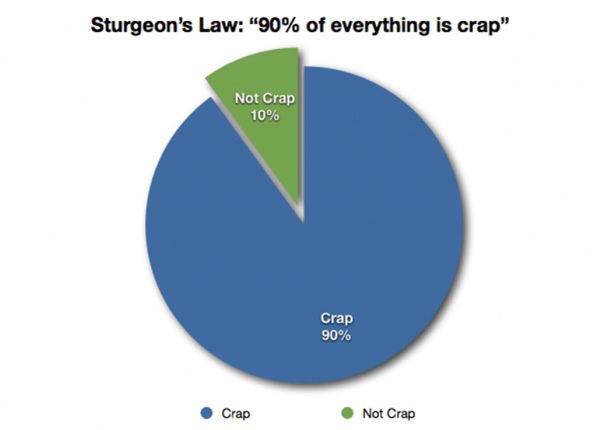You've
heard of Murphy's Law, no doubt. But how about Sturgeon's Law? How
about Skitt's Law? No? Then you have to read this nifty article by Chris
Higgins over at mental_floss about 11 wacky "laws" named after people.
For example:
1. STURGEON'S LAW
The law: "90% of everything is crap." (In some versions, "crap" is replaced with "crud.")
The story: Science fiction author Theodore Sturgeon wrote a defense of sci-fi in the March 1958 issue of the sci-fi magazine Venture. He wrote, in part (emphasis added):
I
repeat Sturgeon’s Revelation, which was wrung out of me after twenty
years of wearying defense of science fiction against attacks of people
who used the worst examples of the field for ammunition, and whose
conclusion was that ninety percent of SF is crud. Using the same
standards that categorize 90% of science fiction as trash, crud, or
crap, it can be argued that 90% of film, literature, consumer goods, etc. are crap.
In other words, the claim (or fact) that 90% of science fiction is crap
is ultimately uninformative, because science fiction conforms to the
same trends of quality as all other art forms.
Two
trivia notes on this one. First, as you can see above, Sturgeon himself
termed this "Sturgeon's Revelation," however, accidents of history (and
the OED) turned it into Sturgeon's Law. There actually is a
"Sturgeon's Law," and it is: "Nothing is always absolutely so." Second
note — Sturgeon is the basis for Kurt Vonnegut's recurring character
Kilgore Trout.
3. SKITT'S LAW
The law: "Any post correcting an error in another post will contain at least one error itself."
The story: Skitt's Law is just one of many internet-themed corollaries of Muphry's Law,
which itself states: "If you write anything criticizing editing or
proofreading, there will be a fault of some kind in what you have
written." So horribly, horribly true. (And yes, "Muphry" is an
intentional misspelling referencing Murphy's Law.) Apparently the law was first coined by G. Bryan Lord, referring to a Usenet user named Skitt.
Read the rest:
Here.


No comments:
Post a Comment